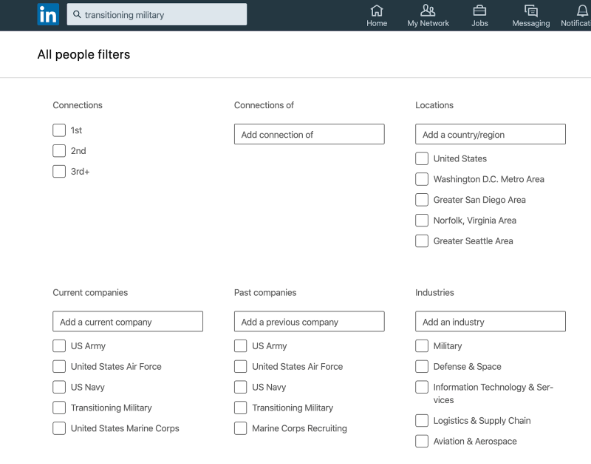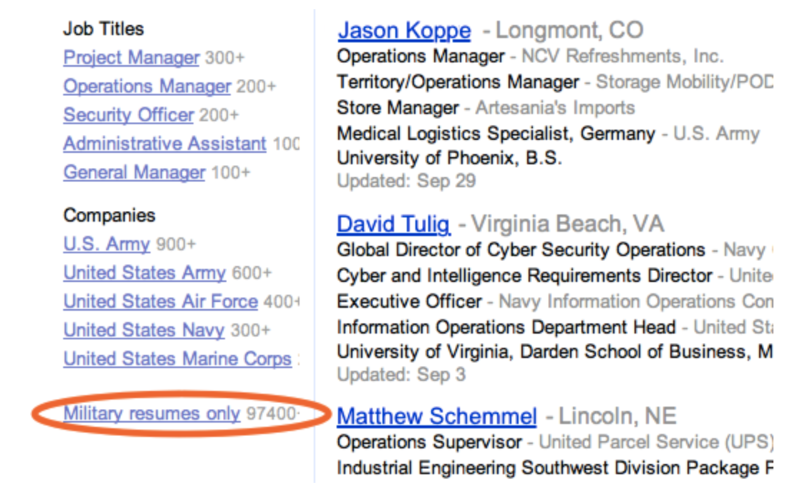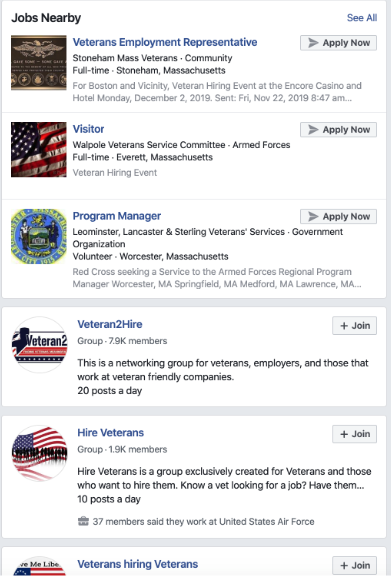Imagine if there was a group of people that had received thousands of dollars of training, taught to be leaders and problem solvers.
Equipt with the ability to jump into any new position and come out successful.
A group of people that had a mindset geared towards working for the common good and putting their work before themselves.
Employers would beg and plead to have an employee like this.
And yet, many veterans with the above qualifications have trouble finding jobs.
Separated and retired veterans are one of America’s greatest untapped resources.
You need people like this in your company, but just like they have trouble finding available jobs, some employers often find it difficult to locate veterans as well.
This guide will share a step-by-step process that employers like yourself can use to quickly and effectively find talented military veterans to hire.
What benefits can hiring veterans bring to an organization?
Many times the military doesn’t take personal strengths into assigning new jobs to service members.
They put people in jobs based on the needs of the service and expect them to succeed.
Most do.
The qualities that this teaches a person can make veterans stand apart and there are many reasons why employers should target this group of individuals.
Reason #1: Veterans Excel Under Pressure
While there are many types of jobs in the military, one thing that is constant across the board is that service members are used to working under pressure. Deployed or not, they are expected to perform, and even excel, when faced with deadlines or awful conditions.
From the time that they enter their service-related boot camp, training people to deal with stress is an emphasized skill.
Now obviously, normal corporate jobs will not require employees to make a decision under the pressure of enemy live fire. However, the foundation built and skills learned on how to keep calm when faced with a deadline or setback is a quality that would translate to many professions.
Reason #2: Veterans Are Adaptable
This is an undervalued quality. Service members are told where to live, what job they will be doing and even what type of physical condition they need to be in.
Military personnel are masters at adapting to their environment.
When they have to deploy, they don’t only leave the comfort of their homes and life with their family, but they deal with having to be successful even when faced with remote living conditions and high stress jobs.
All while making sure that the mission succeeds.
Reason #3: Trainable
As referenced before, military members are often just placed into positions that need filling. It doesn’t always matter that the individual has zero experience in the subject.
This is why it doesn’t really matter that they don’t have any experience in a certain industry or position. If you hire the person with the right personal qualities, an employer can train them into most positions needed.

Is there a tax break to hiring veterans?
Yes!
Not only does hiring a veteran benefit a business because most veterans have the foundation to flourish wherever they are planted, but there can be a monetary benefit to an employer.
Companies can save thousands of dollars a year in tax credits.
In 2011, Veterans were added to the IRS’s Work Opportunity Tax Credit (WOTC) list of eligible groups.
Only certain veterans are eligible, one being veterans who were unemployed for at least four weeks but fewer than six months in the one-year period prior to their hiring date. Some types of disabled veterans are also eligible.
In addition, there is no limit to the number of employees that can be hired to receive credit. The credit is $9,600 for for-profit employers. Just as an example, if an employer hired 7 eligible veterans, the tax credit would be over $67,000.
There is also a bill that has been introduced to add military spouses to the eligibility list in the future.
Where to hire veterans (they can work remotely):
The best part about the recent transition to remote work is that you don’t need to look for veterans in your location if you have a position open that can be completed remotely.
If you are looking to hire veterans, don’t think you have to focus on locations.
Many veterans are great at time management and have goal-orientated skills, so targeting this group of people is easier than ever before.
There are now LinkedIn and Facebook groups dedicated to helping veterans connect with employers. You can look up “transitioning military” in the search bar area of social media platforms or Google to try and connect with those searching for positions.
Let’s specifically look into the places that you can find veterans.

How to find veterans to hire:
1. LinkedIn (The King Of Hiring Veterans)
If you just type in “transitioning military” into the search bar, you will pull over 60,000 results. If you have a specific position you are looking to fill, you can then filter it based on whatever criteria you are looking for.

Some common filters would be the current company (like Air Force, Army, etc.), city, schools, industry and a few others.

When you apply the filters, you can then connect with or message the people that look like they would be a good fit for the position.

If you need more help with LinkedIn, feel free to look into American Dream U’s LinkedIn Training specific to the transitioning veteran. This can help you understand what many veterans are doing when they set up their profiles and thus you can target them in a smarter way.
2. Job Boards Like Monster Or Indeed
Many job board websites make it a point to allow employers to search for military resumes specifically.
In response to the 2011 initiative by Michelle Obama, in conjunction with the launch of the “public” resume by particularly on Indeed, there is a search option to narrow the search to military resumes or to look for potential employees that have “US Army” or the other branches mentioned somewhere in their resume.

Even if you aren’t using Indeed to post positions, look for similar filter options to target veterans.
Here is a great resource that lists many websites that veterans are using to search for positions.
3. Networking
Have a way to track all your potential employees and build up your network. When you meet a potential contact at a networking event or anywhere else, make sure to have a method to track the way that can help you in the future.
This will help you build a team of people to reach out to when a new position comes open and will allow you to not have to do as much work when faced with a tight deadline of filling a position with a veteran quickly.
4. Job Fairs
There are a number of veteran-only job fairs all over the country.
This is a great place to get some face-to-face time with potential veterans and be able to judge if they will be a good fit for a job.
Many times it is hard to judge character based solely on a resume, so this is a great way to be able to meet candidates.
If you have a budget to host a table at these events, that is great, but even just showing up and handing out business cards can be a helpful way to network.
Another benefit is that many big name job fairs will have a “hire veterans” website that you can put your company’s information on if you become a sponsor.
5. Post On Your Website
When a person is searching for a job, especially ones with detail oriented people like veterans, you want to make sure that you differentiate yourself from common scam job postings. The easiest way to increase your credibility is building a trustworthy website.
If your company doesn’t already have one, talk to your web designer and add a link for job postings in the menu bar and in the footer of your pages.
This is also a great link to post on your social media platforms to help drive people to the posting.
6: Share On Social Media
Where to post jobs for veterans? Veteran social media groups!
There are many groups in the various social media platforms that have been made to link up employers with veterans. It is simple to make a company Facebook page, for example, and then look for veteran groups to post a job in. Often times it is accompanied by the hashtag jobopp (for job opportunity), like this: #jobopp.
This alerts those looking for a position or those that know veterans looking to read more into your post.
Go to the “groups” tab on the left hand side on your dashboard when you log in, then you can type in your keywords into the search bar. Like “hire veterans.”
The first grouping that comes up will be “Jobs Nearby,” which won’t be particularly helpful if you are looking for people for a job that you have available. But the second section will show groups that are relevant to your search.
The groups will even show you how many members are in it before you join, so you can gauge what your reach will be. Make sure to read the rules of each group to see if you are allowed to post your position, since every group is different.



